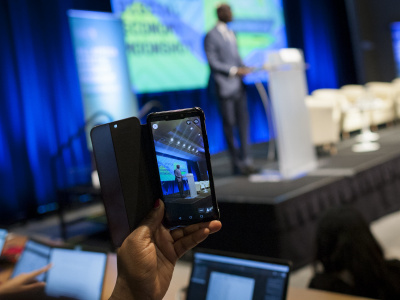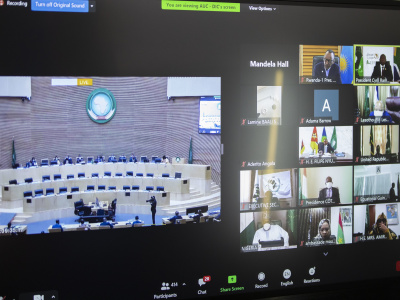
Africa Day: The AU's role in African and global affairs – Part 1
For Africa Day 2021, commemorating the founding of the African Union (AU)’s predecessor, the Organisation of African Unity (OAU), we asked our team working on African institutions and regional dynamics to share their thoughts on key processes shaping the AU’s role in African and global affairs. In the first commentary of a two-part series, Philomena Apiko, Lidet Tadesse and Martin Ronceray take a governance and security perspective.
Philomena Apiko – Rethinking AU partnerships
The transition from the OAU to the AU, launched in 2002, reinforced the need to promote African integration and speak ‘as one’ on the international stage, to defend Africa’s interests and strengthen its position in the global economy and international community. As part of the AU reforms, the AU is rethinking how it engages with its external partners to achieve its Agenda 2063 vision of continental development.
With the ongoing development of a partnership strategy and policy framework, the AU seeks to put ‘Africa first’, refocusing its existing and emerging partnerships towards its priority needs. So far, most partnerships have been categorised as a donor-recipient relationship, perceived at least to be led by donors. The AU and its member states have not always been clear or coordinated on their priorities when engaging with multiple and diverse partners, and challenges around coordination of external support have resulted in fragmentation and duplication of efforts. The strategy development process will hopefully allow the AU to identify its needs as well as existing challenges and gaps which require the support of partners. Then, it should help pinpoint the partners with the right competences to support the AU development agenda.
Greater solidarity and collective action on priority areas are therefore imperative to strengthen the AU’s agency when engaging with external strategic partners. Such partnerships should be based on equality, accountability, mutual respect, efficiency, ownership and win-win cooperation, ensuring that the continent derives maximum benefits. With the launch of the African Continental Free Trade Area (AfCFTA), partnerships are needed for infrastructure and industrial development, which are key to increasing intra-African trade. Partnerships are also vital for continental priorities such as peace and security, migration, climate change and building resilient health systems in the wake of the COVID-19 pandemic.
As Africa is strengthening its global voice through its common positions, it needs partners who are able to support it both in the global sphere and continentally, as it tailors its African agenda. Going forward, the AU should focus on quality – and not just quantity – when it comes to partnerships.
Lidet Tadesse – Greater integration, more coherent voice?
Recent developments suggest that the AU is increasingly ready to represent African interests in international fora and negotiations. But given the AU’s intergovernmental set-up, it has to negotiate its international role on a case-by-case or thematic basis.
To take peace and security as an example, the AU is recognised as a key peace and security actor in Africa. It takes the lead in promoting African peace and security interests at the global level through the UN, given continental and international acknowledgement of its efforts. At the same time, neither the AU nor any of its member states have permanent representation in the UN Security Council (UNSC), although around 70% of peace and security issues on the UN’s agenda are African. This means that the AU must coordinate with the A3 – the three non-permanent African members of the UNSC – to ensure council decisions are in line with the analysis and consensus of the African Peace and Security Council (PSC).
But members of the UNSC do not always heed the PSC’s positions. The permanent members want to remain ultimate decision-makers in global peace and security and retain their influence on decision-making on certain conflict portfolios in Africa – some arguably relying on their colonial and post-colonial legacies.
But for the AU, the challenge isn’t only the refusal of the UNSC to reform in line with the global power shifts that have taken place since its establishment. AU member states themselves do not always align with PSC positions. The A3 members sometimes give in to pressure from other members of the UNSC and break the ‘African voice’ in the council – often arguing that they are in the UNSC in their national capacities and not as AU representatives.
The AU has therefore learnt that it must ‘get its house in order’ to ensure member states speak with one voice on pertinent global matters, as is envisioned in Agenda 2063. On peace and security, it is working with the A3 to better coordinate the works of the PSC and the UNSC, including on contentious issues such as the financing of AU peace and security operations.
In due time, these efforts could lend themselves to an AU that has a broader and stronger mandate to manage the continent’s relations with international partners and represent continental causes in global fora. This might entail a revision of the AU’s legal mandate and constitutive identity, which won’t be an easy deliberation among AU member states.
However, recent history equally shows us that African states can be versatile and adapt to global shifts and contextual changes they find themselves in. The establishment of the OAU to rid the continent from colonialism and the transformation of the OAU to the AU were African responses to global and continental contexts. Perhaps the next frontier of pan-Africanism would be to proactively influence – and not just respond to – global debates and decisions. This is a role the AU is well suited to assume.
Martin Ronceray – AU reforms announce changes to the governance and security agendas
In parallel to these more internationally focused efforts, a set of reforms are taking place within the AU. These focus on structures, staffing and funding, but have important implications for some key work areas.
With the recent merger of two departments into a ‘super department’ for Political Affairs, Peace and Security (PAPS), a new power is rising within the AU architecture. The commissioner elected to head it, Bankole Adeoye, took his position with unprecedented support from member states. Coming from Nigeria, a country that tends to be a ‘swing state’ with high influence on continental issues, his department is showing signs of a dynamic start, with a 100-day plan published internally and currently being rolled out.
Peace and security is a clear priority for African member states. The PAPS merger may herald a better institutional arrangement to work on conflict prevention and bring a renewed profile, provided the department does not suffer too much from future budget cuts and strong heads of divisions are promptly appointed. All this suggests that there should be interesting developments in a crucial area where the AU sets a discourse, promotes normative frameworks and is occasionally able to get involved operationally as well.
The implications are more complex for political affairs, the other leg of PAPS. Governance has been a priority for African countries as mismanagement of diversity, resources and political differences are often the root cause and drivers of insecurity and conflict. But they never took kindly to the AU taking too forceful a role in sovereign affairs, including their own governance limitations in the shape of corruption, flawed elections or altered constitutions. Hence the AU has been stuck between different expectations from its member states and from its Western partners, who are often the holders of the purse and have been known to promote a sometimes simplistic ‘good governance’ agenda.
By contrast, the PAPS merger offers the opportunity to start dealing with governance in the way African countries want it to be: as part of a continuum of issues, from security to political affairs, where context matters more than any predefined template of how political processes need to take place in the best of worlds. This should cause some soul-searching among development partners, for instance in terms of how they engage with civil society organisations to foster the societal home-grown demand for improved governance, including in contexts of reduced civic space. This may be an uncomfortable discussion, but there are already lessons learned from efforts to do so, and it is likely to result in less lip service and a reinforced governance agenda down the line.
The Africa we want
As once stated by Kwame Nkrumah, one of the OAU’s founding fathers, “[w]e all want a united Africa, united not only in our concept of what unity connotes, but united in our common desire to move forward together in dealing with all the problems that can best be solved only on a continental basis”.
As we’ve seen here, there are significant initiatives and trends coming from the African Union and its member states, pertaining to how the continent engages with the world, how it coordinates its action and voice, and how it will seek to reclaim the driver’s seat when it comes to peace and security, multilateral diplomacy and governance. Reinforced common African positions are likely to ensue as well as more strategic engagement and reinvigorated narratives on peace, security and governance, in particular coming from the rising power of the new PAPS department of the AU Commission. External partners and observers need to stay tuned and adjust to the changes to avoid losing relevance, and all actors concerned would do well to salute and support the changes that result in growing strategic autonomy in African continental and multilateral affairs.
In our second commentary, which will be published next week, Bruce Byiers, Poorva Karkare, Alfonso Medinilla and Amanda Bisong zoom in on trade and movement in pursuit of a green recovery.
The views are those of the authors and not necessarily those of ECDPM.






